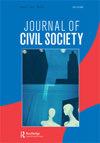The #MustFall movements and traditions of national liberation in South Africa: Political continuities and ruptures in theory and practice
IF 0.9
Q3 POLITICAL SCIENCE
引用次数: 1
Abstract
ABSTRACT The #MustFall campaigns attacked symbols of the past – physical but also mental legacies of the colonial and apartheid periods – using specific disruption mechanisms along with ideological frameworks that are sometimes consciously and/or unconsciously borrowed from previous generations of South African students. In that respect, the students claim a continuity of their present day struggle with that led in the 1970s under the banner of Black Consciousness. All the while, the born-frees completely reject the main outcome of the struggle for National Liberation – that is, the negotiated settlement signed by Nelson Mandela and F.W De Klerk in the 1990s, which could appear paradoxical. The aim of this article is to shed light on both the continuities and ruptures between the #MF campaigns and traditions of national liberations in order to discuss the political practices they entail in a post/decolonial context. Theoretical shifts in #MF notably through the engagement with concepts such as intersectionality, non-racialism and decolonization had certainly a great impact on their modes and means of protest. This comparative analysis may lead to a deeper understanding of the different interpretations of decolonization in practice between generations and the nature of the discrepancies not only between but also within political traditions of liberation .南非民族解放的#MustWall运动和传统:理论和实践中的政治连续性和断裂
#MustFall运动攻击过去的象征-殖民和种族隔离时期的物质遗产和精神遗产-使用特定的破坏机制以及有时有意识和/或无意识地借鉴前几代南非学生的意识形态框架。在这方面,学生们声称他们今天的斗争延续了20世纪70年代在黑人意识旗帜下的斗争。与此同时,生来自由的人完全拒绝民族解放斗争的主要结果- -即纳尔逊·曼德拉和f·w·德克勒克在1990年代签署的谈判解决方案,这似乎是自相矛盾的。本文的目的是阐明#MF运动与民族解放传统之间的连续性和断裂,以便讨论它们在后/非殖民化背景下所需要的政治实践。#MF的理论转变,特别是通过与交叉性、非种族主义和非殖民化等概念的接触,无疑对他们的抗议模式和手段产生了巨大影响。这种比较分析可能导致更深入地了解各代人之间对非殖民化的不同解释,以及不仅在解放政治传统之间而且在解放政治传统内部的差异的性质。
本文章由计算机程序翻译,如有差异,请以英文原文为准。
求助全文
约1分钟内获得全文
求助全文

 求助内容:
求助内容: 应助结果提醒方式:
应助结果提醒方式:


